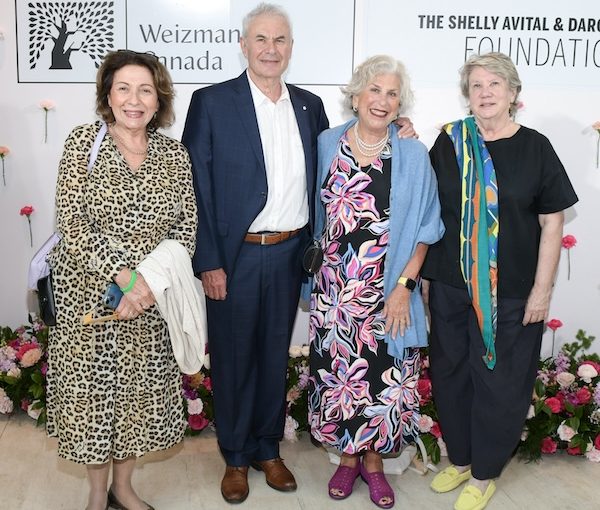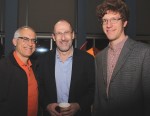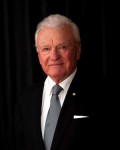Weizmann Canada event speaker Dr. Brian Berkowitz, centre, with attendees David Berson, left, and Raffi Reitzik. (photo by Sydney Switzer)
Everyone who attended the Oct. 15 lecture The Quest for Clean Water left the intimate theatre at Science World with a thoughtful look, still digesting the sheer mass of information Weizmann Institute of Science Prof. Brian Berkowitz shared.
The event was introduced by local Weizmann Canada chapter member Dr. Hillary Vallance, a medical biochemist at B.C. Children’s Hospital and a professor at the University of British Columbia. UBC Prof. Jonathan Berkowitz took the stage next to give a more in-depth and personal introduction of the speaker, who happens to be his brother.
Brian Berkowitz heads the department of earth and planetary sciences at the Weizmann Institute in Rehovot, Israel. His talk took many twists and turns, the topics ranging from recent developments in his lab around technologies in water purification, to nanoparticles in sunscreen. He took the audience into the world of hydrology (the study of water), sharing facts, advice and stories.
He began with the message of how interconnected everything is on the planet. But one example is the regular occurrence of a dust cloud from the Sahara blowing minerals to the Amazon to enrich the soil in the rainforests there. He believes that “greening” the Sahara would kill the Brazilian rainforests. In addition, he predicts that, within as little as a decade, parts of Europe and North America will become much cooler because of interference of the melting glaciers in Greenland with an oceanic current.
The Weizmann Institute has some 2,700 staff and students who explore basic science, he explained. And it is this freedom to delve into basic science that has produced so many breakthroughs, including those in the area of water purification.
“Working at the Weizmann Institute is a dream job,” he said. “I know my research will be supported, that I can get expensive equipment if I need it, with no pressure. The only thing I need to do is be the very best in the world at what I’m doing.”
Diving into the topic of the evening, Berkowitz said that, in northern Alberta, there are vast pools of water made highly toxic by its use in oil production. The water came from the Athabasca River and sits in pools, contaminating the environment, untreated.
Berkowitz has discovered a technology that would not only decontaminate this water, but could make it so clean that it would be drinkable. Why is it not being used? “The technology is expensive,” he said. “More importantly, it is difficult to change people’s perception about where the water came from, so they don’t want it back into their water systems even though it’s been purified.”
He gave the example of an experiment where people were asked first to swallow regularly a number of times. Then they were asked to spit into a glass of water and drink their own saliva mixed with the water. The subjects found it difficult to stomach their own saliva. This simple study illustrated the difficulty in convincing governments to give the go ahead on releasing water that was once toxic waste.
Another challenge with the technologies that his and other labs produce is the expense of getting them to market. Berkowitz said investors are looking for a big, quick return and, at this stage, making clean water does not generate the kind of money necessary for the capital required. Even governments are not yet prepared to invest. Eventually, there will be little choice but, for now, much of Berkowitz’s technology stays with the Weizmann Institute, ready for the future.
Although it is frustrating that existing technology sits idle instead of cleaning up environmental disasters, Berkowitz had some good news. He discussed ways in which perceived water shortages can be mitigated. “Most cities waste 30% of their clean, treated water through leaky pipes,” he said. “It’s not so much an issue of shortage, as a distribution problem.” He also encouraged people to eat less beef. “It takes 15,000 litres of clean water to produce one kilogram of beef. If people ate less meat, we’d save a lot of water.”
Berkowitz explained how he has made a number of groundbreaking discoveries by being in the right place at the right time. He spoke of an experiment that caused an explosion in his lab when he was out for lunch – and led to the discovery of a technique using nano-disruptive technology to purify very polluted water completely in eight hours.
Berkowitz then took questions from the audience, which led to a discussion on the organic food movement and the dangers associated with the “natural” elemental chemicals used in organic farming that he believes are, in many cases, more harmful than manufactured pesticides. He also opened other cans of worms with examples of how pharmaceuticals are polluting the world’s water supply; which foods absorb toxins through groundwater; why sunscreen is scary; and his new project that uses MRIs of rocks to predict how long an oil spill will take to reach groundwater. All topics, hopefully, of future Weizmann lectures.
For more information on how you can become involved with the Vancouver chapter of Weizmann Canada, contact development associate Camille Wenner at 604-260-8506 or 604-315-4430 (cellphone), [email protected] or via weizmann.ca.
Michelle Dodek is a freelance writer living in Vancouver.



